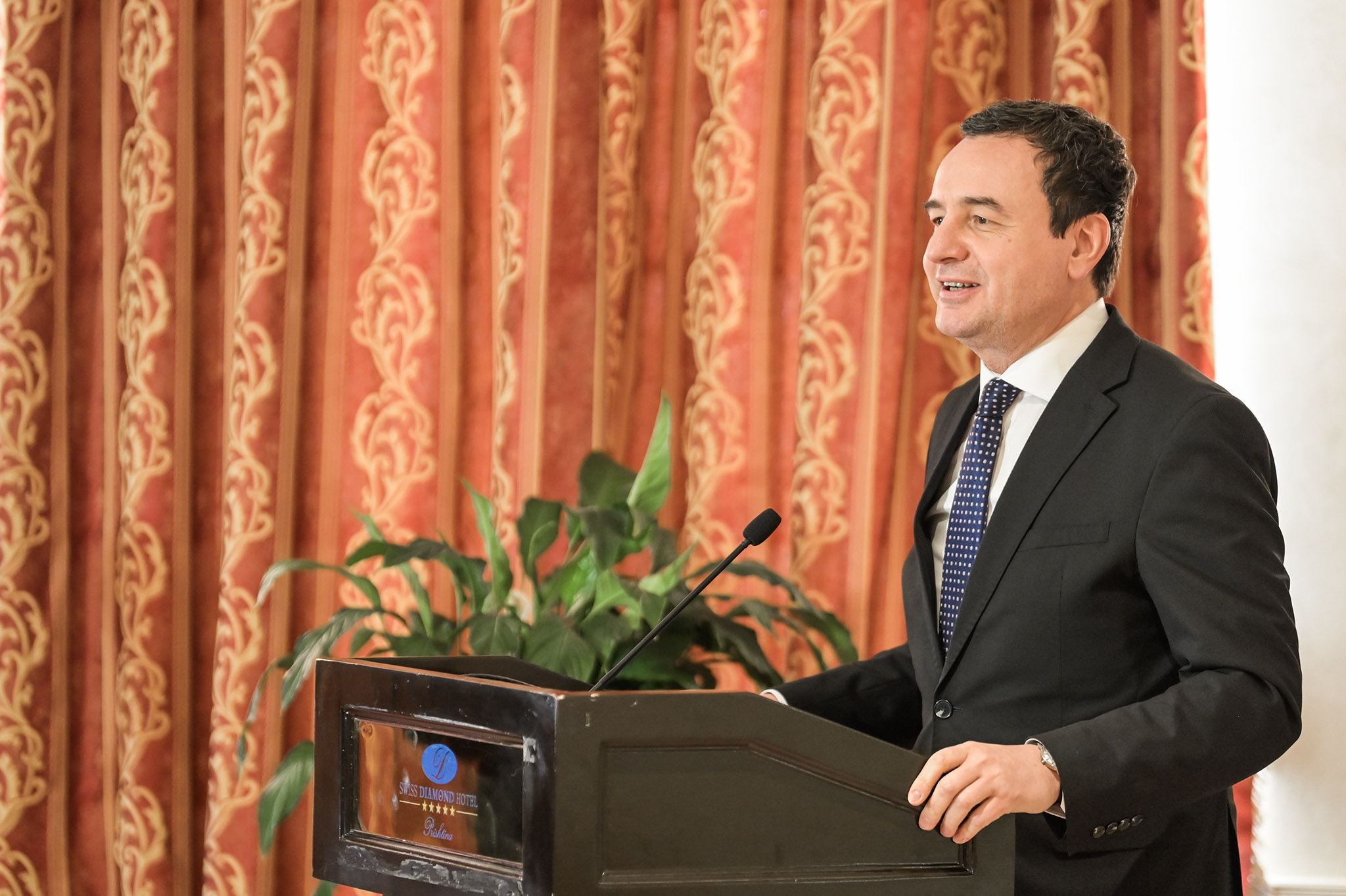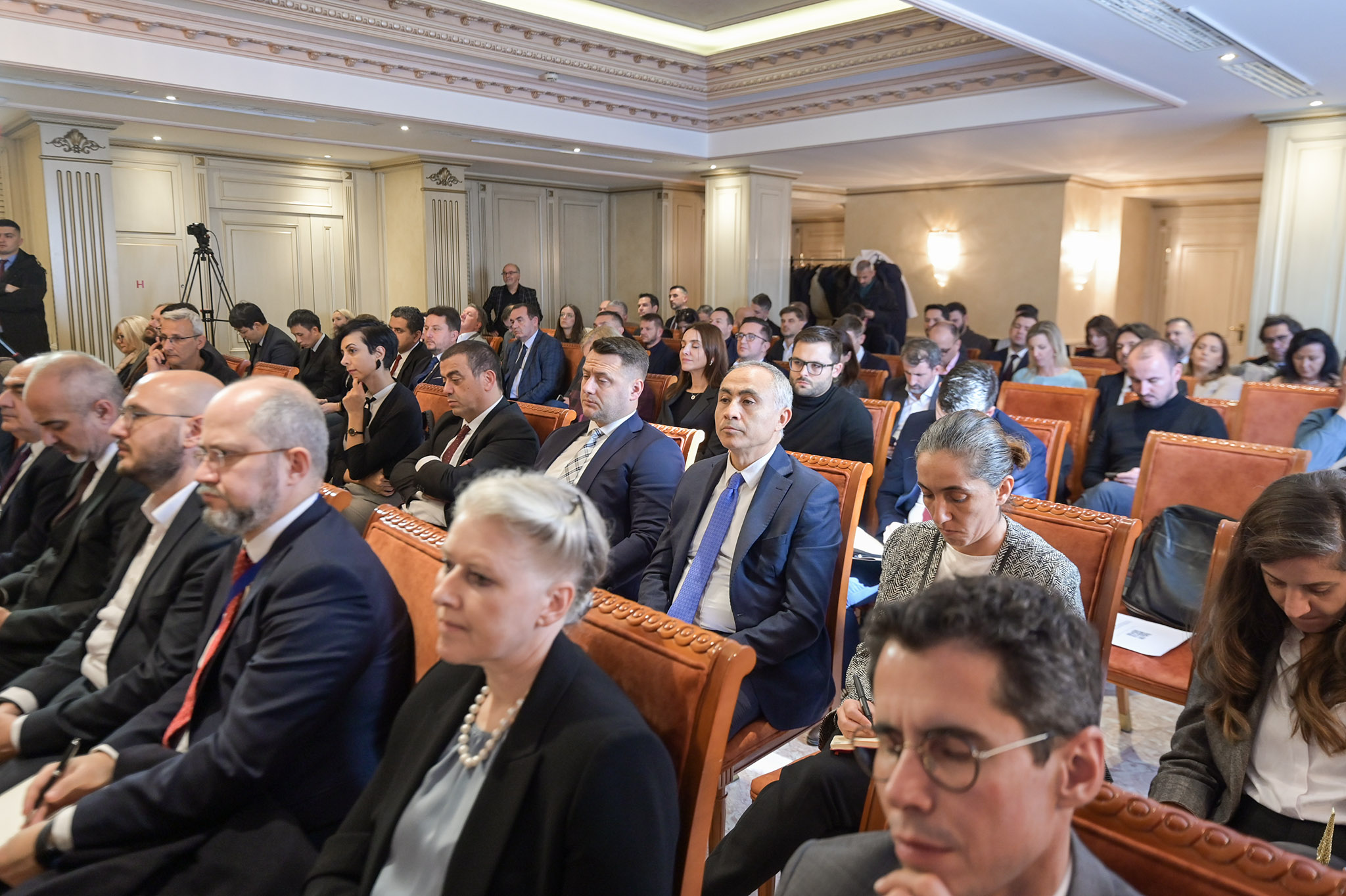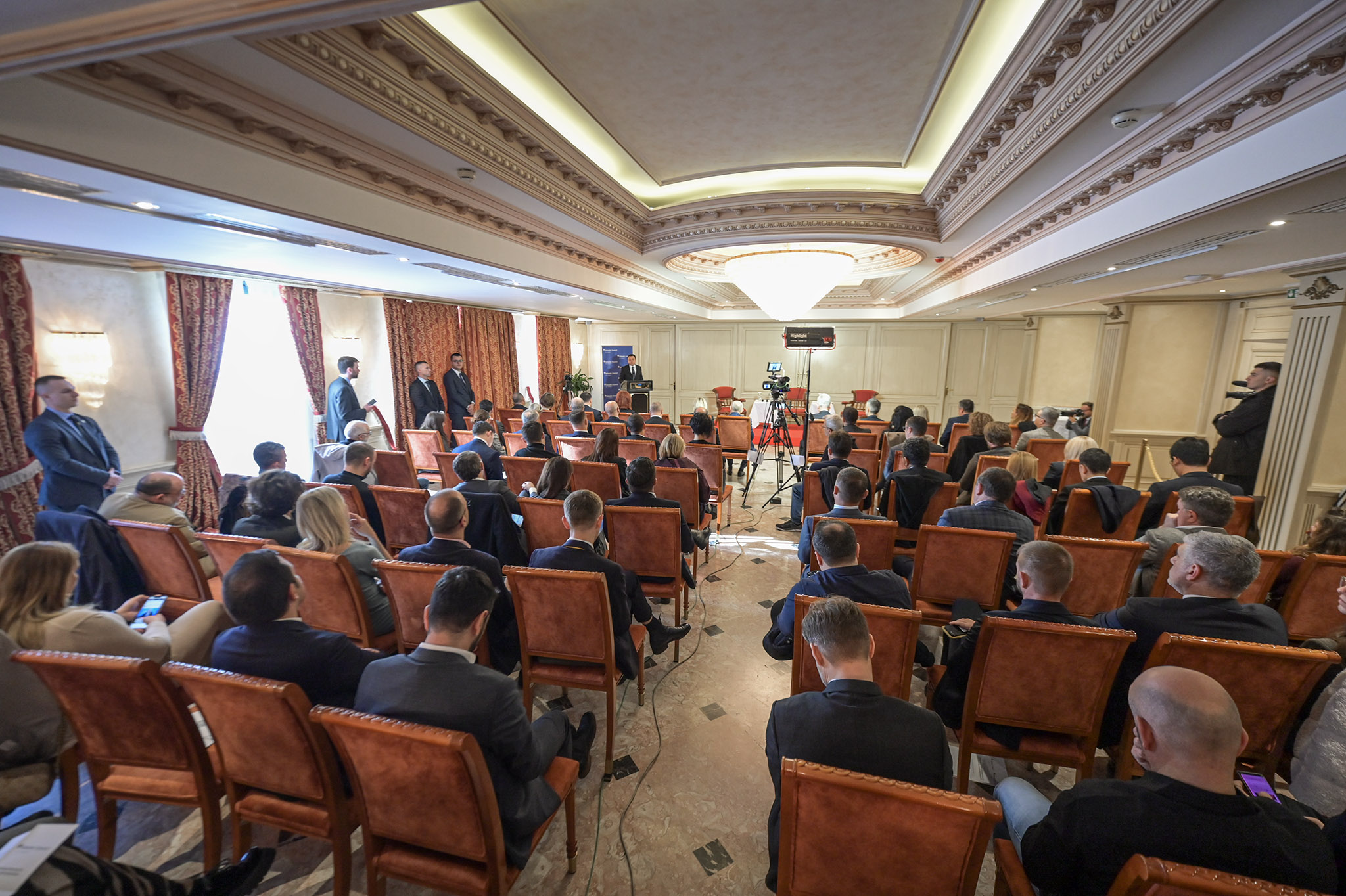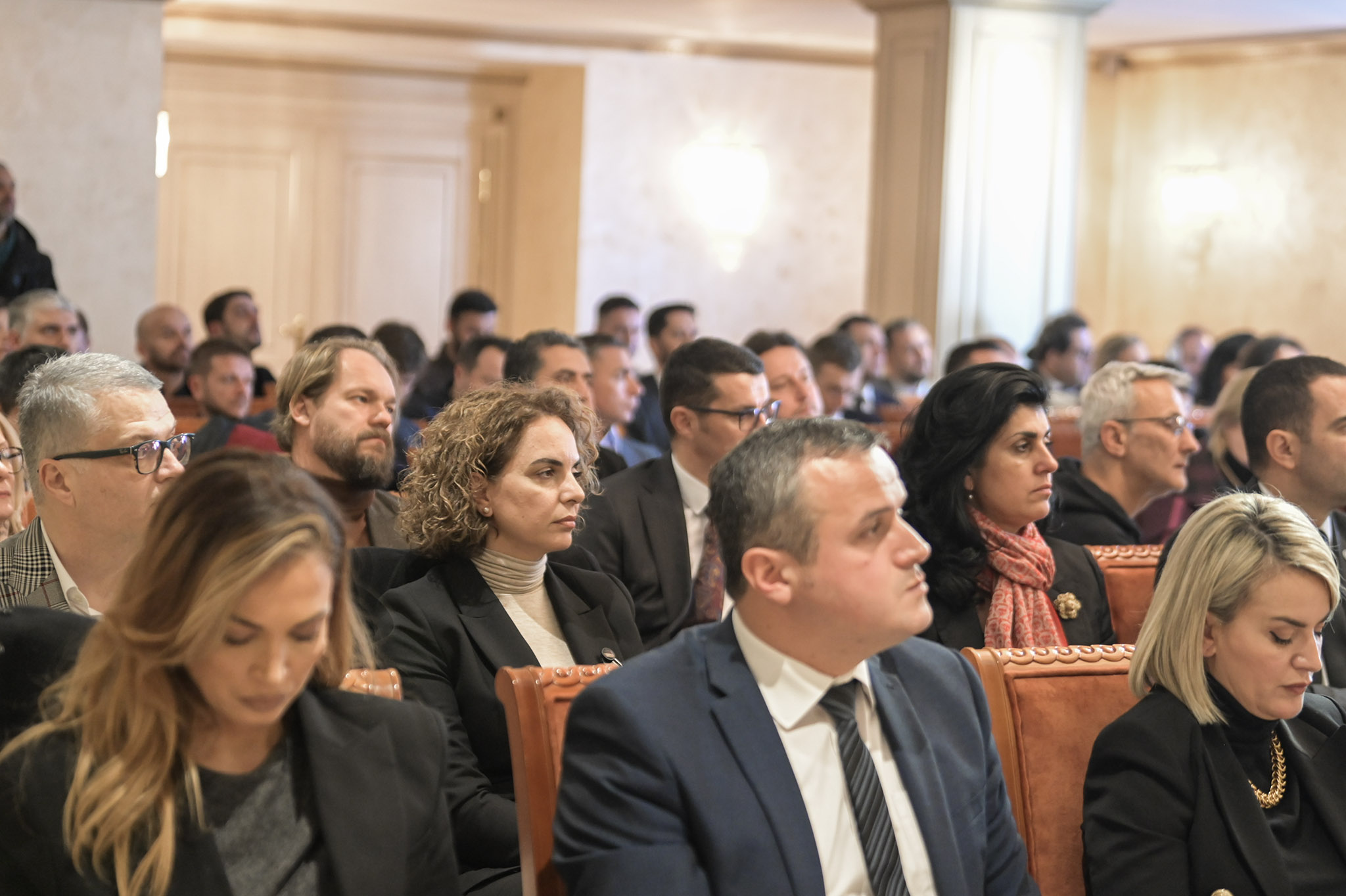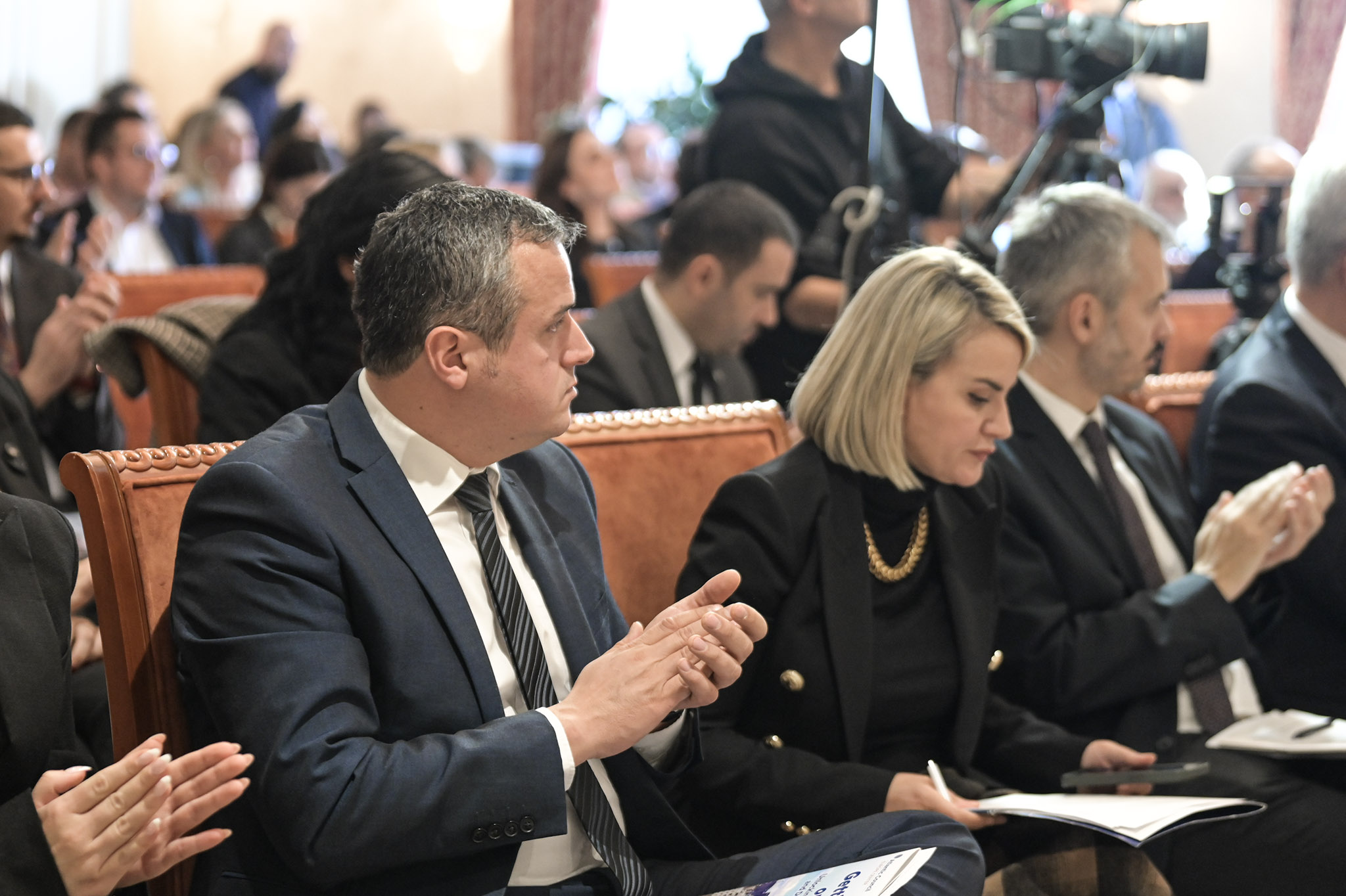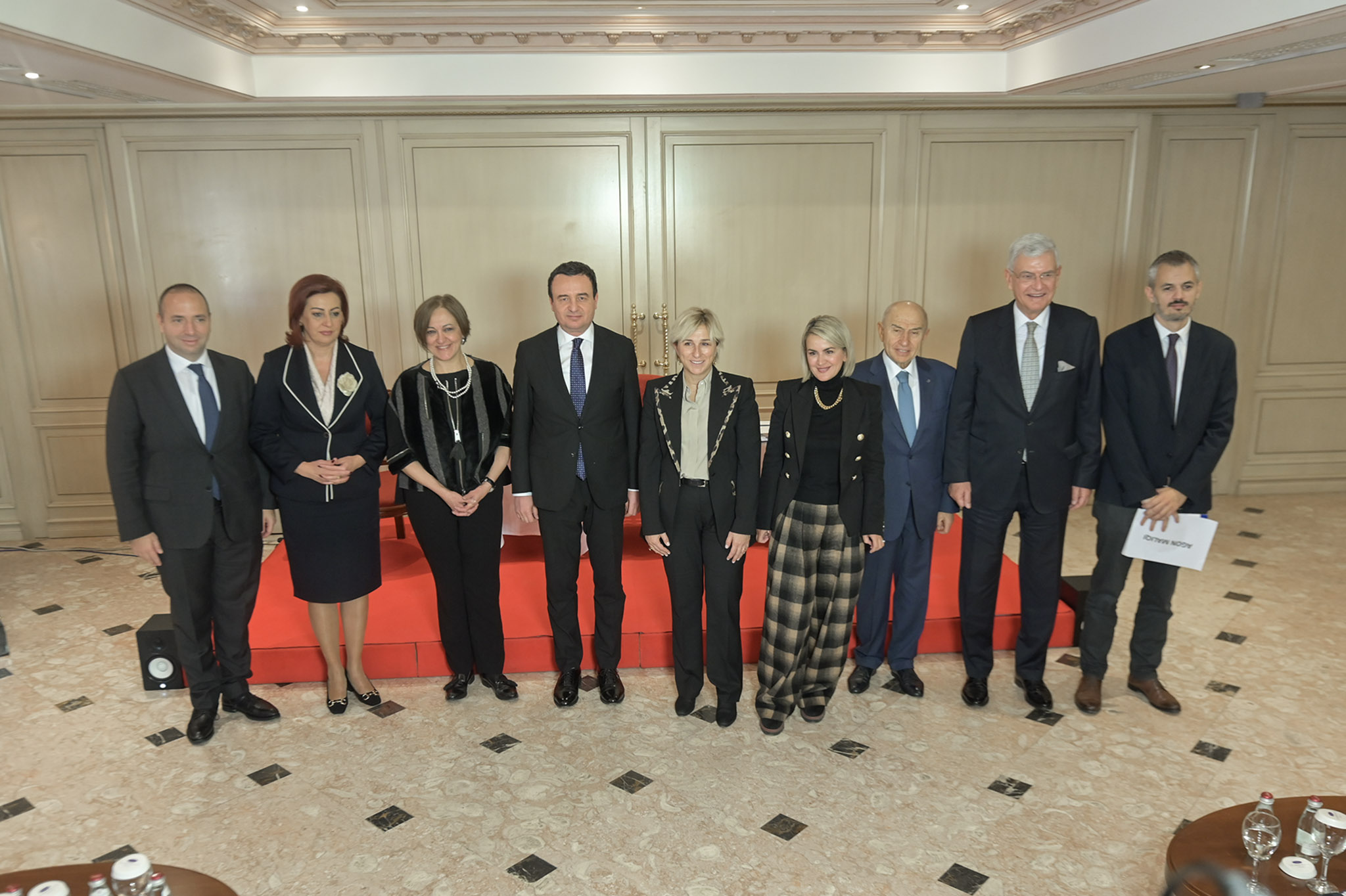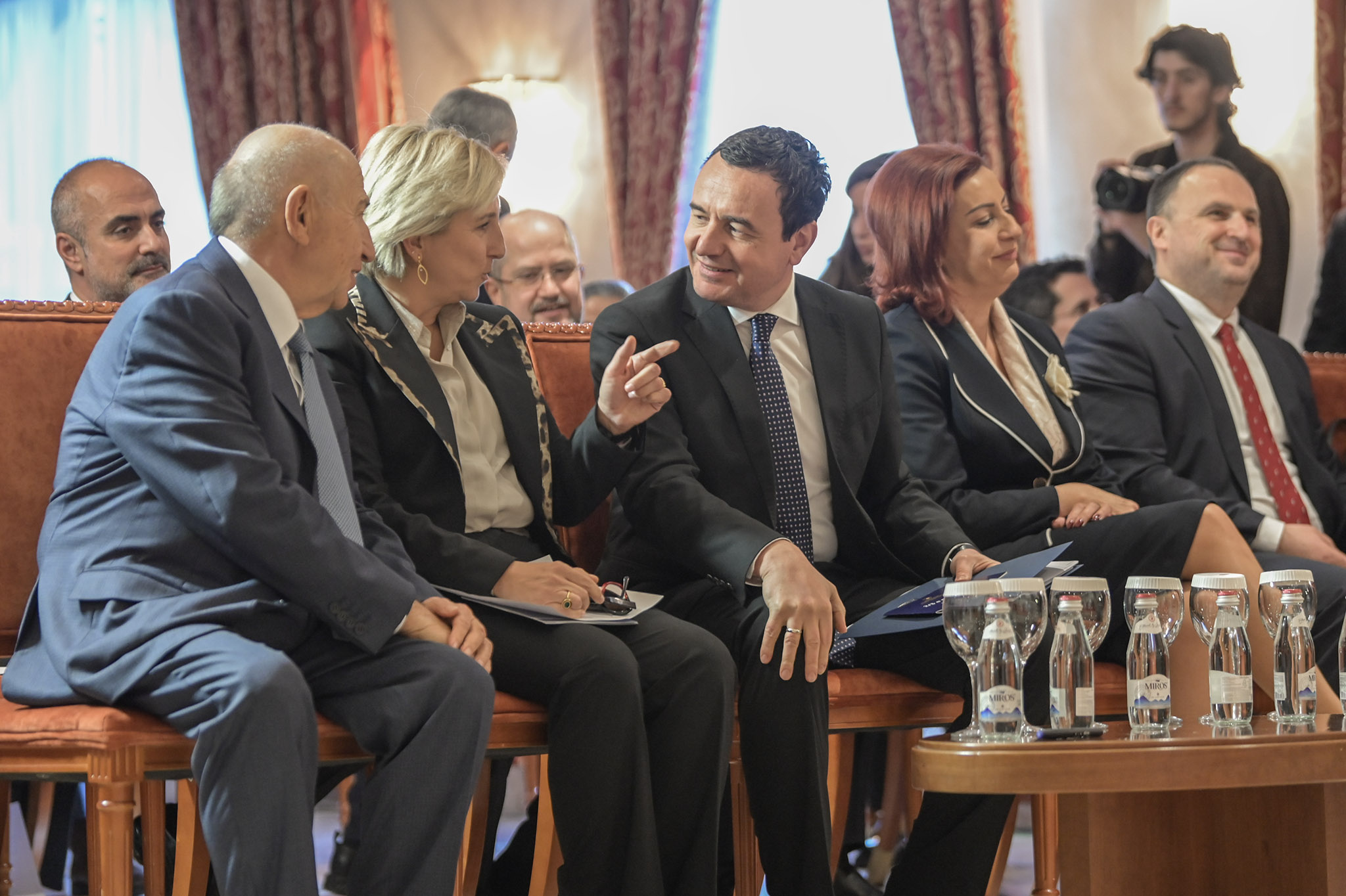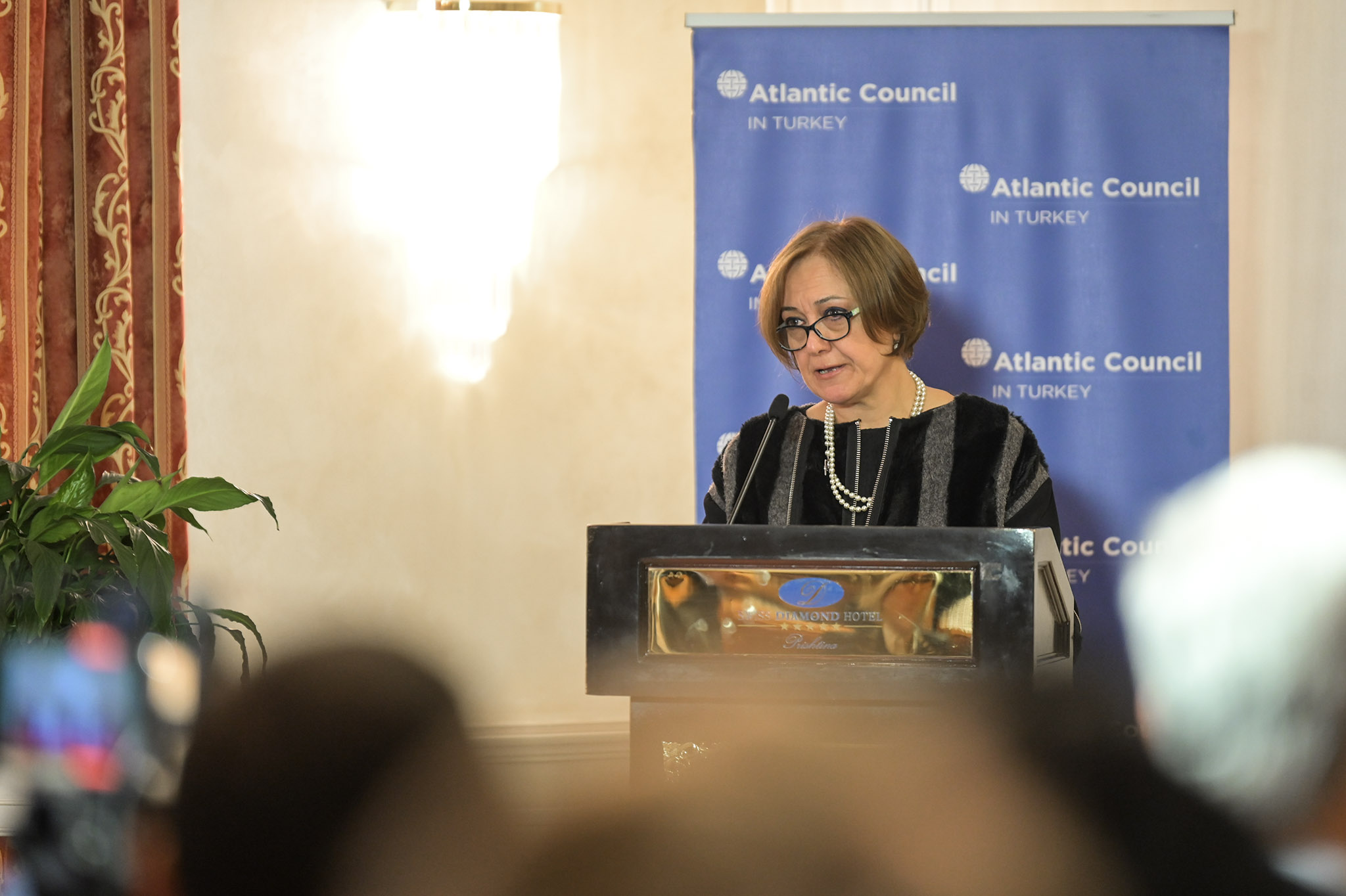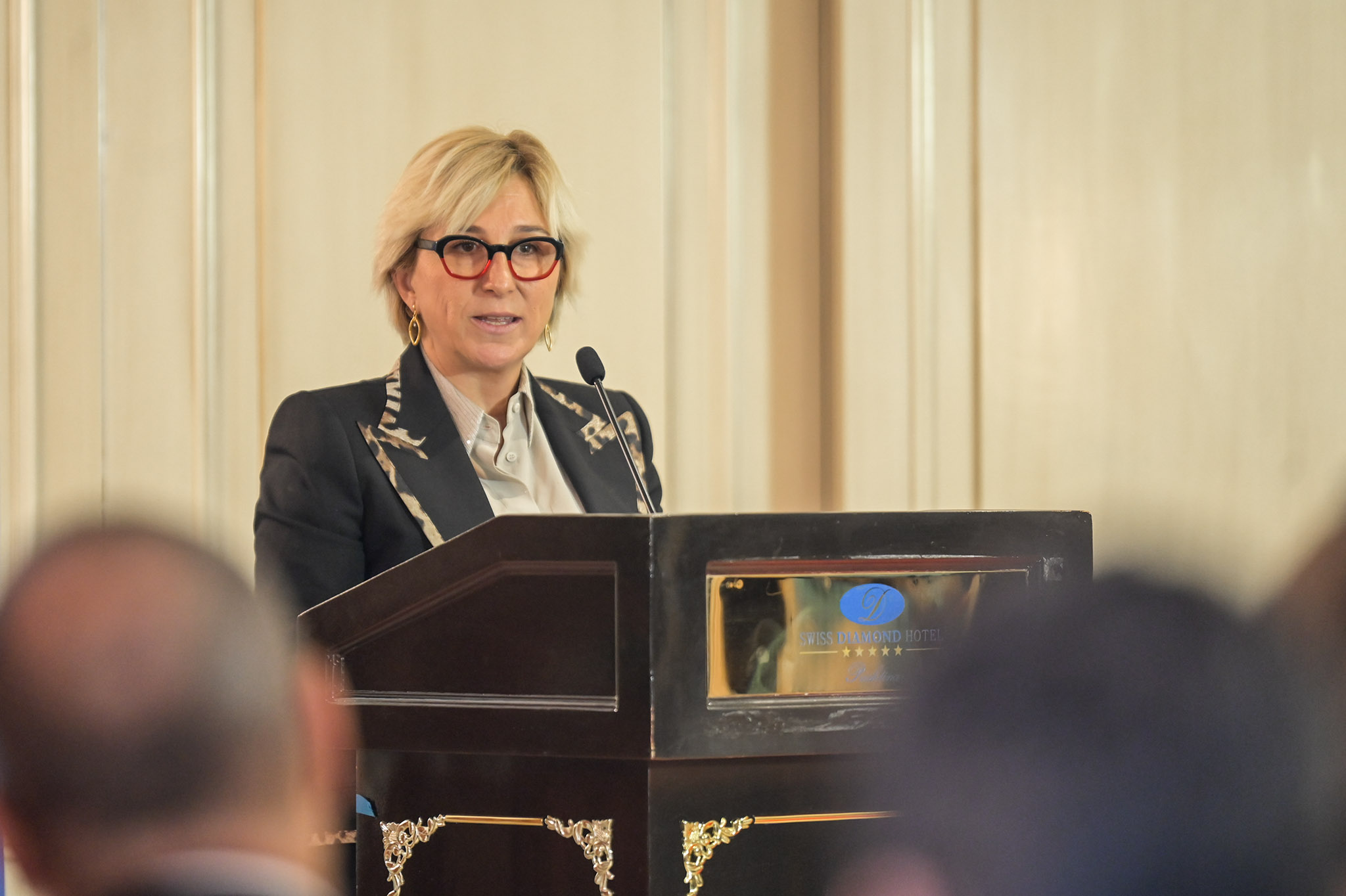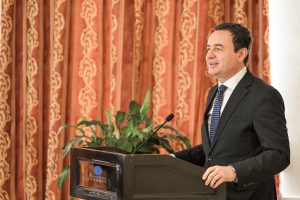Prishtina, 13 December, 2023
The Prime Minister of the Republic of Kosovo, Albin Kurti, participated in the launch of the report “Returning to the right path, Breakdown of the Euro-Atlantic and development perspective of Kosovo” by the Atlantic Council.
In his address, the Prime Minister recalled the historical importance of Kosovo’s struggle for freedom and independence, achieved with sacrifices over the centuries and recently with the intervention of NATO. He reflected on the role of the international community, especially the United States, in supporting Kosovo and emphasized the importance of understanding the reasons behind such interventions.
The Prime Minister raised concern about the use of Kosovo as a precedent to justify interventions elsewhere and condemned this approach as an attack on truth, humanity and international norms. He reaffirmed Kosovo’s commitment to democratic values and emphasized its history of success in state building and socio-economic development since the declaration of independence in 2008.
He called on the five EU countries that do not recognize Kosovo to recognize it, saying that this is the common responsibility of the transatlantic community. He emphasized the importance of normalizing relations with Serbia and mutual recognition.
As for internal issues, the prime minister spoke about Kosovo’s achievements in economic growth, job creation and social welfare. Discussed ongoing challenges in areas such as education, health and energy and the government’s strategies for addressing these issues.
In conclusion, the prime minister emphasized Kosovo’s commitment to membership in the European Union and NATO, stressing the need for a merit-based process for nations that aspire to join these organizations. He expressed optimism for the future trajectory of Kosovo and reinforced the commitment of the government to continue the trajectory for a prosperous and democratic state.
Prime Minister Kurti’s complete speech in English:
Dear Mrs. Defne Arslan Senior Director, Atlantic Council in Turkey,
Dear Mrs. Ozdemir,
Dear Mr. Volkan Bozkır, an old friend with whom we met first over 10 years ago,
Honorable ambassadors,
Dear members of Parliament, colleagues from the Government,
Distinguished guests, ladies and gentleman,
Thank you for the invitation to address you today.
The Atlantic Council is a friendly organization of the Republic of Kosova and a well-known platform to speak openly with each other about the political and economic challenges we face as an Atlantic community in a changing world. Congratulations also on the report, although I don’t fully share some of the assumptions made.
Not to dwell on history, but I think those who know this region, know well that Kosova’s freedom and independence are not a gift. It was won after centuries of occupation and different empires and regimes. It was won with the sacrifice and the blood of our people through generations.
Most recently, besides our people’s liberation struggle, led by the United States, it was won also with the intervention of the most powerful alliance in human history – NATO. Just as it is imperative to recall the event, it is also imperative to understand the reason behind such an intervention, which was to stop the genocidal campaign of a dictator.
Although the most recent, this wasn’t the first time that the United States led a coalition against dictatorship in Europe. In the Second World War, the United States helped liberate France and the rest of Europe from the Nazi regime.
Kosova declared independence in 2008, not unilaterally but in concert and coordination with international community. After the genocidal campaign that led to NATO intervention; after years of UN administration; after years of negotiations in Vienna led by the UN Special Envoy Martti Ahtisaari, who later won a Nobel Peace Prize and concluded in the report sent to the Security Council for approval that: The only viable option for Kosova is independence, supervised independence which lasted for four years.
So, it is very interesting to recall now that almost 25 years ago, in spring 1999, 19 countries got together to bomb a European country, it must have been very bad. As we know today, 19 countries sometimes can’t issue a press release together, but back then, they bombed Milosevic’s Yugoslavia. On 15th of January, we are going to commemorate 25 years of the horrible Reçak massacre, which was a clear indication that in Kosova we have Srebrenica on the making. On the other hand, in September 2012, 25 countries together, comprising international steering group, jointly concluded that supervision of Kosova’s independence, should be terminated. We have 19 countries together, all western democratic saying that Milosevic’s Yugoslavia should be bombed and we have 25 countries together in September 2012 saying that Kosova is fine, it should be fully independent and supervision shall be terminated.
To use Kosova as a precedent to justify intervention elsewhere, like Kremlin is doing, is nothing but a direct attack on truth, humanity, and sanity. It also shows a complete disregard for international law and the responsibility to protect, as an international norm seeking to ensure that the international community never again fails to halt the mass atrocity crimes of genocide, war crimes, ethnic cleansing, and crimes against humanity. This was a concept that emerged and was enforced after NATO intervention in Kosova and was adopted unanimously in 2005 at the UN World Summit, the largest gathering of Heads of States and Government in history.
It also shows disregards for the International Court of Justice, which by ten votes to four gave the opinion that the declaration of independence of Kosova, adopted on 17 February 2008, did not violate international law. Our planet doesn’t have a higher court than ICJ, therefore the legal debate on declaration of independence of Kosova has been concluded on 22nd of July 2010.
I believe that now, when far-right movements and autocrats are on the rise, the Atlantic community and democracies must be even more active. This first and foremost would relate to joining of the five EU non-recognizers to the rest of 22 members of EU who do recognize the independence of Kosova, by pushing dictators and extremists to air false narratives and draw false comparisons to justify their hegemony projects. So it is not only we who would be helped. It is the transatlantic bridge and the democracies in the world today who make a leap forward in combatting this right wing extremism and autocratic tide which is taking place in democratic west, coming out victorious sooner rather than later.
Undoubtedly, Kosova is a success story of NATO intervention on one hand, and of democratic state-building and socio-economic development on the other hand. Independent evaluators show that Kosova is a champion of democracy in the region with the fastest democratic rise in the last three years in rule of law, political rights and civil liberties, liberal and electoral democracy, transparency, and anti-corruption. It also has the highest economic growth on average compared with the region.
So, task number one is to get the five EU non-recognizers to recognize Kosova, and this is and must be a shared task among the transatlantic community because it is a shared responsibility.
Of course, normalization of relations with Serbia matters. It matters because Serbia is our neighbor with whom we share over half of our border and we can’t change geography and history. It also matters because Serbia has initiated all wars in former Yugoslavia where it neither took responsibility nor apologized for all the human suffering, crime, and destruction they caused. On the contrary. Today it keeps 48 military forward operating bases like a horseshoe around Kosova and this horse shoe in 1999 was inside Kosova, now is around it.
In the first two years of our government, Serbia brought its military 4 times to the border, flying Russian Mig 29 planes, Russian Mi-35 choppers and it brought Russian T-72 MS tanks. Serbia unfortunately has not changed, nor has it democratized. Instead of showing remorse for the crimes it committed in the past, it keeps threatening new wars. This is why normalization matters. Normalization of relations between Kosova and Serbia, needs normalization of Serbia, in a democratic and european sense of the word.
And all this not only because Kosova’s membership in international organizations must not be objected to, but because Kosova and Serbia must be able to live side by side as normal neighbors, through good neighborly european relations.
This is why I welcomed President Biden’s letter in 2021 that put mutual recognition at the center of a future normalization agreement between Kosova and Serbia. Because mutual recognition is mutual acceptance of reality which must also include dealing with the past to enable reconciliation.
Faced with the Russian invasion of Ukraine, the Atlantic community urged to settle for less. Instead of a final agreement centered on mutual recognition, it pushed rather for an agreement “on the path towards normalization”, “centered on mutual de-facto recognition”.
Of course, our government is for dialogue and in any circumstance, we only engage in agreements that further advance Kosova’s interests and strengthen our statehood, and that do not lessen or undermine it.
Yet our question is legitimate. Why ever settle for less? Why appease Vucic?
If there is any lesson to draw from the war in Ukraine, it is that appeasing autocrats never works. They take generosity shown to them as a sign of weakness, fear or both. They unfortunately only understand resilience and democratic force.
But instead of sticks, the President of Serbia has been approached with carrots. The more trouble he makes in the region; the more money he asks and takes from the EU. The more he moves towards Russia and China, the more the EU chases him with funds. Meanwhile, ever since he came to power, Serbia has only backslid into autocracy.
Despite all this, Kosova has remained committed, constructive, and creative in the dialogue. We now have an Agreement which must be protected by those who brought it. It cannot be the case where a legally binding agreement is violated without consequences. Yet Serbia has violated it on numerous occasions without any consequence. We can’t hope for a sustainable implementation of the reached agreements without having first and foremost respecting of those agreements. What we see currently is at least weekly based breaches and violations, sometimes of the letter, sometimes of the spirit, usually of both, of the Basic Treaty we have agreed on 27th of February this year.
That is why we have asked for this Agreement and its accompanying documents to be signed. Excruciating pain in the right hand of president of Serbia cannot be used as an excuse not to sign what we agreed.
Last year, on the 15th of December in Prague, I submitted our application for membership in the European Union and we are in the process of becoming a member of Council of Europe.
Kosova’s future lies within the European Union and NATO. Our commitment to membership will never waver, but it is our shared responsibility to address decision making so that those who want and deserve to be members of the community should also have the possibility. EU is not going to force people and nations to become members of the EU, to join the European family, but those who want to, those who work for it, should be offered a merit based process, a real opportunity with high probability, while we work and think together as we pace along towards the european family.
Those who want and work should have normal logical advantage. Kosova’s future lies within the EU and NATO, our commitment to membership will therefore never waiver, I emphasize that we are not looking for alternative’s and we do not want any alternatives. But precisely because of this, by saying that EU and NATO are the only alternative, we are supposed to meet on the other hand, on the other side, real possibility and probability for advancing and success.
When it comes to domestic affairs, I would say that Kosova is on the right track. This country changed tracks on the 14th of February 2021, in a landslide election never seen before. What is needed now is to shift gears forward because the track has changed. According to all credible democratic indicators, Kosova is on the right track of democratic advancement and economic growth. These two are essential to develop a country with strong rule of law and economic prosperity. But, I agree with the assumption of the report that the landslide victory of February 14th 2021 has brought high expectations.
And I would say that this is not just because of the election victory, but also due to the modern digitalized world where we are living in, where citizens see the whole world in a single handheld device. They see what life is like in other places. They compare it with their own and they seek change fast. So, there is, I would say, an expectation delivery gap, in the sense of speed not capacity. Our government has delivered more in less than three years than previous governments did in a decade.
Take the economy for example. In two years we’ve added €2.1 billion to the economy. The previous governments needed three years to add 1 billion, and now each year we are adding more than 1 billion. We continuously fought the informal economy and had a double-digit growth of revenues, which resulted in €860 million to be added to our state budget. Budget in 2024 will be by 35% higher than the budget in 2021. Over 1/3 increase, in three years only, of annual state budget. For the first time next year, we expect to have a two digit billion GDP, which is an increase of 40% in comparison with 2019 and 50% with the year 2020, which was the first pandemic year, when we had virus without vaccines.
Or take the exports. In the first two years of our governance, we doubled exports. In 2020 they stood at 475 million euros, whereas in 2022 they stood at 920 million. As a result, the ratio of exports to imports fell from 1 to 9 to less than 1 to 6. As a social democratic government, we have distributed close to a billion euros in three years without adding new debt; introduced for the first time allowances for new mothers and children where more than 387 thousand children under the age of 16 and more than 50 thousand mothers have benefited; we created new jobs with polices such as ‘Government for Families’ and ‘SuperJob’ where 10 thousand jobs were added.
We have doubled the budget for defense, and increased investments in armament by 191%. We have conducted 1100 police operations; closed 34 illegal roads, 26 of them in the north; destroyed 16 drug labs, 9 of them in the north as well as 6 crypto-mining labs also in the north and confiscated 2.2 tons of narcotics.
All this while we were facing multiple world crises such as the Covid-19 pandemic and later the economic and energy crisis that saw an increase in prices. However, here we have a positive trend as well, inflation in January was 12%, it fell to 3.3% in October this year.
But again there is a gap in the speed of delivery. This gap is in part due to the unresolved problems that have piled up in the last two decades, but also be they for example lack of investment in, say, the energy sector, healthcare, education, and training for new jobs, but also at the same time there are structural problems that take time to address because the change doesn’t have the form of a new event, but of new structures in place for new processes.
For example, the lack of investment in the energy sector, despite growing demand, has brought us to a situation where we cannot meet our energy requirements. There are two power stations built in the 1960s and 1980s which require constant repair and cause too much pollution. We have acted. In our first two years we responded with a strategy that will increase production capacities for renewables by an additional 1.2 GW by 2031, and with nearly 1 billion in new investments in projects for making the energy transition a reality for Kosova. Solar park 100 MW, the auction is opened until 31st of January, we are offering 15 years of power purchase agreement and 30 years of land lease agreement, and mid next year, we’ll open the other auction for generation of electrical energy by windmills, 150 MW, in contrast to this one solar park 100MW, will be non-specific site. Whereas solar park, 365 hectares, out of which 120 have to be chosen, is in the village of Kramovik in Rahovec.
We need a just transition, one where funds are not diverted to stop or delay our economic growth and one that does not increase our dependence on energy sources we don’t have. Our country is young, but our education system has not prepared our people for current and upcoming jobs. The education system and the position of the teacher was seen in the past decade as a place to advance and reward party activists in exchange for votes. The same was applied in the healthcare system.
This, together with chronic avoidance of addressing problems that were piling up in the economy, education and healthcare system, has seen hundreds of thousands of young people leave the country, a process that culminated in the winter of 2014 with massive migration and has continuance to a less extent ever since.
This is a problem that threatens to impede our social and economic progress. It is the result of failed policies of the past, which we have been dealing with since day one. Our response to education, has been the introduction of the dual-education system, what the Germans call “Ausbildung”, and we learned this word from our diaspora in Germany and Switzerland, where we are investing in vocational training programs trying to bridge the skills gap between professional education and labour market.
It must be the case that those who get a degree from the university should be able to find a job. That is why we are addressing the huge gap between what a university degree offers and what the job market requires. To refer to what Mrs. Ozdemir was saying, we have allocated around 3000 scholarships for female students in STEM (Science, Technology, Engineering and Mathematics) and now in Kosova, believe it or not, 50% of students in STEM are women. Average EU is 17%. So, we have seen that investing in female students is the highest return case that one can get. Only with scholarships of 1000 euro per year, which are not much, so much can be accomplished.
I believe that our policies will be able to not only stop the emigration of our young people but also reverse it as there are numerous companies now who are bridging Kosova’s potential with Kosova’s talented youth inside the country and abroad.
But, as the latest results in PISA revealed, this is a long process. Addressing this requires teachers to be held to professional standards and understand that being a teacher is a noble profession. It is the government’s job to ensure a decent salary and working conditions, but it is the teachers job to inspire and teach our children so that they can excel.
There is more work, way more work to be done to address mounting issues, but I believe, therefore insist, that we are on the right track.
Thank you very much.

